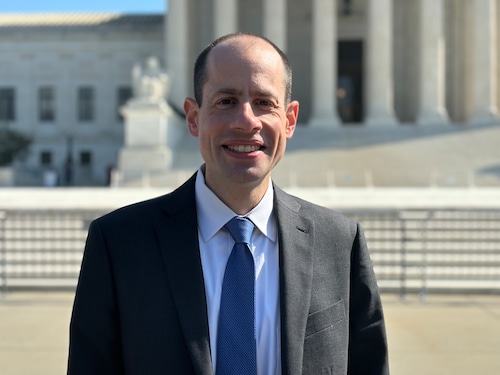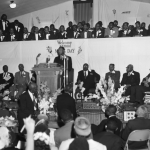The U.S. Supreme Court on Monday confronted the case of Alabama’s overwhelmed unemployment system, at one point hearing the story of Raymond Williams, who was denied unemployment benefits while hooked up to a ventilator in the first year of the COVID-19 pandemic.
“As a result, Mr. Williams is unable to afford his rent, is behind on car payments, and has had to sell personal possessions, including those of great personal significance to him,” stated the 2022 lawsuit over the state’s backlogged system.
Williams sued along with 20 other Alabamians, but the Alabama Supreme Court rejected the suit last year. The state’s top court in 2023 said they couldn’t sue the Department of Labor until they exhausted their appeals. But it was delays and confusion within the appeals process that they were suing over.
In fact, after being turned down, Williams even asked for a new unemployment hearing and explained he had been hospitalized during his first one. The lawsuit says the department rejected his request and told him he had no justification for being late.
That dispute over whether they can sue before exhausting their appeals wound up in front of the U.S. Supreme Court on Monday, as justices weighed whether Alabamians have the right to take their complaints to state court under federal civil rights protections.
Justice Sonia Sotomayor called the situation “Kafkaesque” during oral arguments on Monday. She questioned who the people in Alabama were supposed to complain to if the appeal system did not work.
“Where is it in this process that tells litigants, ‘If we’re not acting, you can go to the appeals council and file something and get them to order the agency to do something?’” she asked Alabama Solicitor General Edmund Gerald LaCour Jr.
But Justice Samuel Alito directed his questions toward the attorney for the plaintiffs, Adam Unikowsky. “Do you contest the principle that state courts are generally completely free to define the jurisdiction of their courts?” asked Alito.
Unikowsky replied that federal civil rights law does not allow “exhaustion requirements,” like Alabama’s rule that plaintiffs complete the appeals process before their rights are addressed.
Central to the case is a Reconstruction-era federal civil rights law called Section 1983, which allows citizens to sue the government if their rights have been violated. The argument before the nation’s high court is whether state courts are also subject to the federal law.
Unikowsky told the justices that Alabamians only have seven days from the time they learn about their unemployment denial to file an appeal, which he noted was more extreme than in a similar case where the court ruled to protect the plaintiffs’ rights.

Justice Elena Kagan questioned LaCour on how long of a delay would constitute a civil rights violation. She asked about a hypothetical delay of a decade.
“At that point can we say this is so onerous a process that it has to be in conflict with 1983?” asked Kagan.
LaCour responded that such a delay might be in conflict, but Alabama’s situation was different.
“Here, this is truly about competence over the subject matter,” he said of the department’s hearing officers. “They have expertise when hearing these types of claims because they hear thousands or hundreds of thousands a year.”
Justice Neil Gorsuch drew a parallel to federal courts. He asked how this was any different.
“If I were to challenge my federal disability benefit claim, identical claim, just against a different government, here, instead of the state, the federal government, you’d almost assuredly have to exhaust your administrative remedies before you could challenge that decision.”
Unikowsky responded by pointing to a case that upheld the rights of citizens to sue under the federal civil rights protection in state court. “The state is not permitted to put that type of barrier in front of vindication of the full right,” he said.
But Justice Brett Kavanaugh later stated he read previous cases to hold that states should not be able to require citizens to go through administrative processes, a so-called “exhaustion requirement,” in similar civil rights claims.
“You’re making your petition seem benign,” he told LaCour, “But we have amicus briefs from a wide variety of groups, from ACLU and Public Citizen to religious liberty groups, to the Chamber of Commerce, all of which say your rule will really hinder federal civil rights claims from getting into state court.”
The case was originally filed in Montgomery County in 2022 by the non-profit Legal Services Alabama.
It challenged excessive delays in the processing of unemployment claims and appeals as well as the department’s decision to demand money back months or years later from many people who did receive unemployment benefits, sometimes demanding as much as tens of thousands of dollars, and sometimes due to clerical errors or other mistakes. In 2022, after news of the state demanding repayments, Alabama Gov. Ivey called the department’s backlog ‘outrageous.’
LaCour told justices that Alabama’s requirement that plaintiffs exhaust appeals is helpful to the people seeking unemployment benefits.
“The exhaustion requirement in Alabama law can be beneficial to plaintiffs because it keeps their well-heeled employers or the secretary from taking them to court immediately.”
Justice Ketanji Brown Jackson repeatedly re-directed questioning to the intent of the civil rights statute and whether Alabama’s requirement blocks the ability of someone to use the federal law to make a claim.
LaCour said he did not see any conflict between state rules and the federal statute. She then asked if anyone in Alabama had ever been able to make a similar claim in state court in Alabama under the federal 1983 statute.
“I’m not aware,” he responded.
Justice Amy Coney Barrett questioned Unikowsky on why the plaintiffs sued in state court instead of federal court.
“State courts hear the overwhelming majority of unemployment insurance claims,” he said, adding that the state court was best positioned to intervene.
During the COVID-19 pandemic, the Alabama Department of Labor was short-staffed and having trouble with its computer system after several years of funding cuts. As many Alabamians lost work due to the pandemic, the federal government offered an added $600 a week of benefits to the existing state benefits. The department was overwhelmed with applications.
Delays have continued at the department for years, according to federal data analyzed by the Century Foundation. In 2024, Alabama was the slowest in the nation to process unemployment appeals with an average 752-day delay. In contrast, other states are processing appeals within 10 days.
“Plaintiffs have experienced extreme delays at every step of the unemployment process,” Legal Services Alabama stated in its original 2022 complaint.
In 2020 the Department received 1,424,739 applications, over a million of which were COVID-related, the state stated in its motion in the 2022 case. Those numbers reflected a 580 percent spike in requests for unemployment during the pandemic.
As for the state’s demands for repayments, the state in 2022 responded to the lawsuit by saying: “Plaintiffs’ assertions that any determinations that they received overpayments incorrectly applied (under) the law are a matter for them to take up by appealing those determinations — not by bringing this collateral suit to skip the line.”
On Monday, Gorsuch questioned LaCour on the state’s progress.
“What assurance do you have or can you give us that, that the state is addressing these claims in a proper and timely manner?” he asked.
He said the state had tripled the number of hearing officers from 8 to 25. He said in January of 2022, the backlog of people who had waited at least 21 days for a hearing was 131,000.
“Today it’s down to about 7,410, and we anticipate clearing that backlog by the end of the year,” said LaCour.
LaCour and Unikowsky declined to comment to AL.com on Monday. The Alabama Department of Labor declined to comment citing ongoing litigation.
Several organizations filed amicus briefs before the oral arguments, including 17 states in support of Alabama and state’s rights. The Chamber of Commerce of the United States sided with the people seeking to sue, arguing that federal 1983 protections are important for businesses who at times need to sue state governments.
“If allowed to stand, the holding would threaten to create serious obstacles to businesses and trade associations that seek to challenge state actions,” the group said











